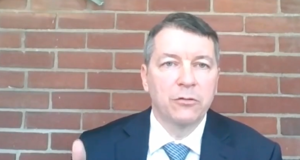Pennsylvania DEP says public supports carbon emission fees

(The Center Square) – The Pennsylvania Department of Environmental Protection shrugged off legislative disapproval of its efforts to join the Regional Greenhouse Gas Initiative this week, pointing to strong public support for its plan to reduce air pollution.
“Over 90% of the [public] commenters spoke in favor of RGGI and our joining it,” DEP Secretary Patrick McDonnell told the Senate Appropriations Committee on Thursday. “More broadly, there’s been polling done out of Yale [University] that within Pennsylvania, 70% of our residents support some kind of carbon fee in order to address climate change.”
RGGI, an 11-state coalition, charges power producers for the pollution they emit. Participating states reinvest proceeds from the fees into programs and projects that lower electricity demand or improve air quality.
DEP says its internal modeling shows that joining the program would reduce carbon emissions by 188 million tons; asthma-causing nitrogen oxide emissions by 112,000 tons; and acid-rain producing sulfur dioxide emissions by 67,000 tons.
McDonnell also estimates that gross domestic product in the state would grow by $2 billion while producing 27,000 clean energy jobs and more than $6.3 billion in health benefits over the next decade.
“Given the overwhelming evidence of what we are seeing in the comments and the polling, that’s what leads us to be confident in making the statement that this is something the residents of Pennsylvania want,” he said.
But lawmakers disagree. Last year, a proposal to halt the state’s entry into RGGI until the Legislature approves passed both chambers with bipartisan support. Gov. Tom Wolf – who in 2019 ordered DEP to craft rules for joining the program as of 2022 – vetoed the bill in November.
If successful, Pennsylvania would be the first state to join RGGI without the blessing of its General Assembly.
“Under the Air Pollution Control, we have the authority to regulate pollutants,” McDonnell said. “Carbon has long been recognized as pollutant.”
Sen. Gene Yaw, R-Williamsport, said RGGI will generate $300 million in emissions fees, effectively levying a tax on the qualifying power plants. Pennsylvania remains a top power exporter in the region and many lawmakers, on both sides of the aisle, have expressed concern that RGGI will raise rates and send plants and thousands of jobs west to less-regulated states.
Yaw also pointed to a Pennsylvania State University study that found 86% of emissions reductions realized through RGGI would just be “picked up” by Ohio and West Virginia when fossil fuel plants relocate there.
McDonnell said the success of RGGI “is very dependent on what happens” with the yearly revenue collected through the program.
“If that gets invested in energy efficiency [programs], you’re driving down the amount of electricity you need and not paying for the most expensive days of the year, which has an equalizing effect across the program,” he said.
Disclaimer: This content is distributed by The Center Square


